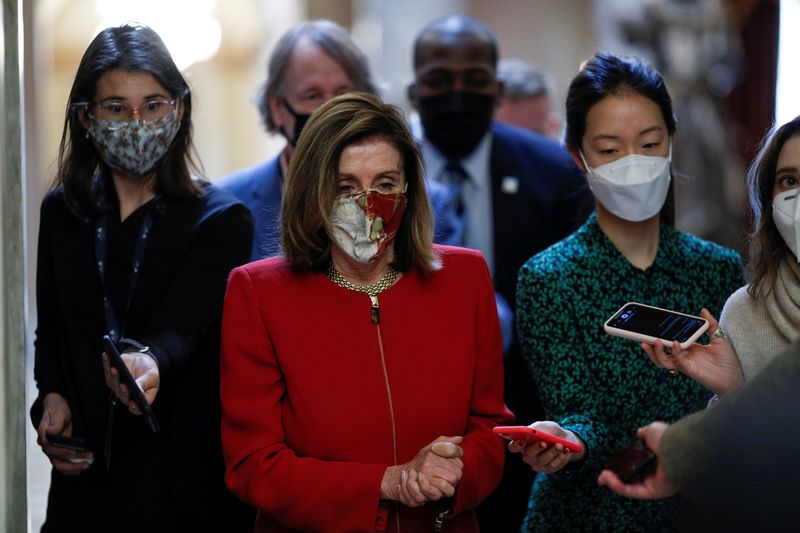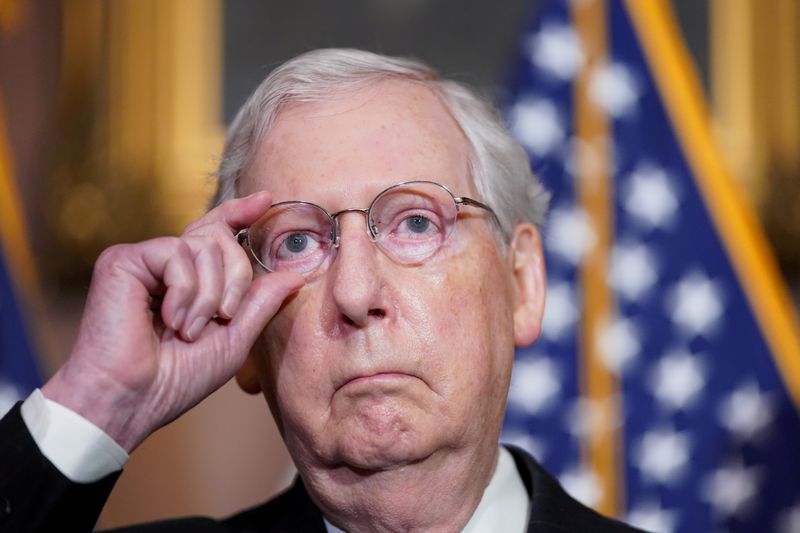By Richard Cowan and Susan Cornwell
WASHINGTON (Reuters) - A bipartisan, $908 billion coronavirus aid plan gained momentum in the U.S. Congress on Thursday as conservative lawmakers expressed their support and Senate and House of Representatives leaders huddled.
Still unclear, however, was how far beyond $500 billion in spending Senate Majority Leader Mitch McConnell would agree to after months of insisting that anything approaching $1 trillion was unnecessary.
McConnell was feeling pressure from even some fellow conservatives, who before the Nov. 3 elections were not eager to approve of Washington shoveling out money beyond the $3 trillion already enacted.
The deepening severity of the coronavirus pandemic, with diagnosed cases exploding and deaths in the United States topping 270,000, appeared to be giving Republicans second thoughts about their long opposition to a comprehensive aid bill.
More and more, said Senator Bill Cassidy, Republicans "recognize that things are getting worse. And that if the economy goes into a recession, it really gets worse."
Cassidy is one of the backers of that measure, which includes extending federal unemployment benefits, providing more loan and grant money for small businesses and aid to state and local governments.
Without quick action by Congress, more than 13 million people are due to lose their government-funded unemployment benefits on Dec. 26.
The U.S. Chamber of Commerce, which represents businesses across the United States, on Wednesday had warm words for the $908 billion bill.
Some of President Donald Trump's biggest boosters on Thursday embraced the proposal.
"I like the effort. It strikes the right balance of compromise and it's a number that's doable," Republican Senator Kevin Cramer told reporters.
Senator Lindsey Graham (NYSE:GHM) added: "The $908 (billion) bill, that's the one I support."
Earlier on Thursday, Trump said he thought negotiators were "getting very close" to a deal, but he did not elaborate. And in another possible sign of progress, Democratic House of Representatives Speaker Nancy Pelosi and Republican Senate Majority Leader Mitch McConnell consulted with each other, according to Pelosi's deputy chief of staff.
"It's been heartening to see a few hopeful signs in the past few days" toward a deal, McConnell said of Democrats' stance on a new aid bill. He did not provide details.
Republican House of Representatives Minority Leader Kevin McCarthy echoed McConnell, but warned that $500 billion was the "starting point and where we'll probably end up."
Democratic leaders have been urging a far more comprehensive, costly bill as coronavirus cases and deaths in the United States surged and some schools and businesses were pulling back on their operations.
Lawmakers are working against a self-imposed Dec. 11 deadline for reaching a deal on this contentious issue.
Dec. 11 is the date that existing funds for operating federal programs expire. Congress is working on a $1.4 trillion funding bill to avert agency shutdowns in mid-December and leaders hope to attach a coronavirus aid bill to that must-do measure -- if only they can reach a deal.
'IT'S NOT 1933 IN AMERICA'
McConnell continued to attack Democratic proposals while touting Republican demands such as liability protections for businesses and schools during the worsening pandemic.
Senate Democratic Leader Chuck Schumer, in a speech on the Senate floor responding to McConnell, said: "In the midst of this generational crisis, the Republican leader does not seem inclined to compromise to actually get something done."
Schumer spoke before McConnell and Pelosi held their conversation.
Democrats had been seeking around $2.2 trillion while Republicans were offering around $500 billion. But this week, Pelosi and Schumer said the bipartisan, $908 billion aid bill should be the basis of new negotiations.
Democratic Representative Dean Phillips, a supporter of the bipartisan plan, underscored the economic distress throughout the United States. "It's not 1933 in America, dammit, it's 2020 in the United States of America," as he held up photos of people lining up for food in his home state of Minnesota.
At the end of December, a range of emergency aid programs in response to the pandemic expire, including additional unemployment benefits and a moratorium on renter evictions.

Meanwhile, Republican Senator Marco Rubio told Fox News that the $908 billion plan was "a great start," although he said slightly more money was needed for a small business loan and grant program than the bipartisan measure would provide.
